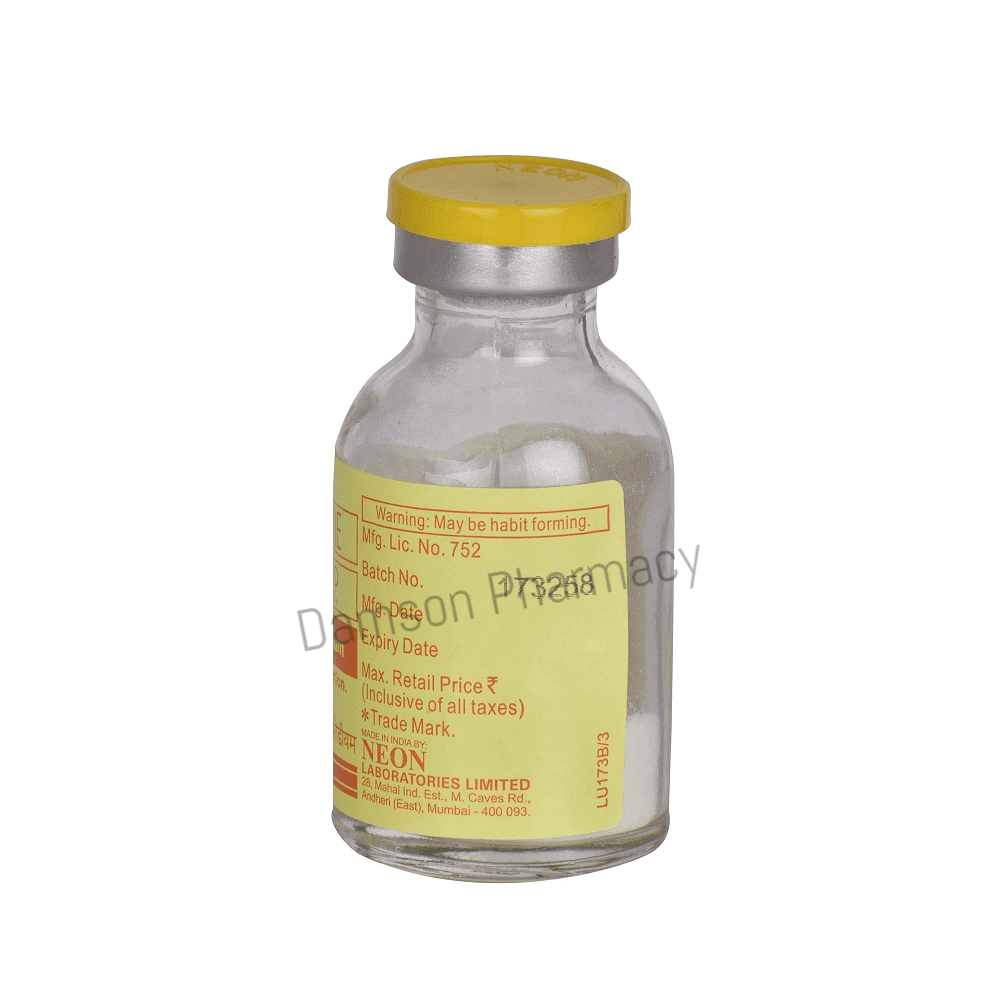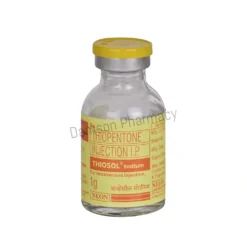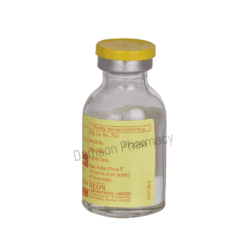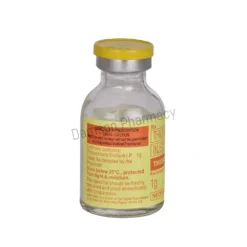Thiosol Thiopentone 1g Injection
$60.00 – $150.00Price range: $60.00 through $150.00
| Pack Size | Price | Price / Unit | Quantity | |
|---|---|---|---|---|
| 3 Injections | $60.00 | $20.00/ unit | ||
| 5 Injections | $90.00 | $18.00/ unit | ||
| 10 Injections | $150.00 | $15.00/ unit |
Looking for bulk / B2B pricing? | Send Inquiry |

| SKU | 11465 |
| Manufacturer | Neon Laboratories Ltd |
| Categories | Anesthesia |
| Delivery Time | 10 - 14 Working Days |
| Strength | 1g |
Introduction to Thiosol Thiopentone 1g Injection
Thiosol Thiopentone 1g Injection is a fast-acting barbiturate used primarily as an anesthetic agent for short surgical procedures. It is also used to induce general anesthesia before administering other anesthetics, making it an essential medicine in emergency and surgical settings.
This injection is commonly used in hospitals and clinics to provide rapid sedation during surgeries, intubation, or emergency interventions. It helps ensure the patient remains unconscious and pain-free during procedures that require quick and controlled anesthesia.
Thiosol Thiopentone 1g Injection is administered intravenously by trained medical professionals. The onset of its effects is typically within seconds, offering immediate relief or unconsciousness when fast action is crucial during surgical or diagnostic procedures.
Uses of Thiosol Thiopentone 1g Injection
- Induction of General Anesthesia
- Short Surgical Procedures
- Emergency Seizure Control
- Pre-anesthetic Medication
- Induction in Intubation or Mechanical Ventilation
How Does Thiosol Thiopentone 1g Injection Works?
Thiosol Thiopentone 1g Injection works by depressing the central nervous system. It enhances the action of gamma-aminobutyric acid (GABA), a neurotransmitter that inhibits brain activity, leading to rapid sedation and loss of consciousness within seconds of intravenous administration.
The drug slows brain activity and reduces the excitability of nerve cells, which induces a deep state of unconsciousness. This effect makes it ideal for the quick induction of anesthesia or emergency sedation, especially in situations where immediate control of the patient’s awareness is necessary.
Side Effects of Thiosol Thiopentone
Common Side Effects
- Mild drowsiness or prolonged sedation
- Nausea and vomiting
- Headache
- Injection site discomfort
- Mild confusion or agitation
- Hiccups
Serious Side Effects
- Severe allergic reaction
- Respiratory depression or arrest
- Cardiovascular collapse
- Seizures
- Extrapyramidal symptoms
- Paradoxical excitement
Dosage of Thiosol Thiopentone 1g Injection
The dosage of Thiosol Thiopentone 1g Injection is individualized based on the patient’s age, weight, and medical condition. It is administered intravenously by a healthcare professional, typically in small doses until the desired level of anesthesia is achieved, ensuring patient safety and effectiveness.
Other Dosage of Thiosol
How To Manage Side Effects?
- Stay in a monitored setting
- Hydrate adequately
- Rest after administration
- Report breathing changes
- Avoid operating machinery
- Follow all post-procedure advice
Warnings & Precautions
Thiosol Thiopentone 1g Injection (sodium thiopental) is a potent anesthetic agent, and its use requires careful consideration of warnings and precautions to ensure patient safety. Here are important warnings and precautions associated with the administration of Thiosol Thiopentone 1g Injection:
1. Hypersensitivity and Allergic Reactions:
- Thiosol Thiopentone 1g Injection should not be administered to individuals with a known hypersensitivity or allergy to barbiturates.
- Allergic reactions, including anaphylaxis, can occur, necessitating immediate discontinuation of the drug and initiation of appropriate emergency measures.
2. Respiratory Depression:
- Thiosol Thiopentone 1g Injection can cause respiratory depression, particularly at higher doses. It is important to monitor respiratory function closely during and after administration.
- Assisted ventilation may be required in the event of severe respiratory depression.
3. Hypotension:
- Thiosol Thiopentone 1g Injection has vasodilatory effects that can lead to hypotension. Blood pressure should be closely monitored during administration.
- Careful consideration is needed in patients with compromised cardiovascular function or hypovolemia.
4. Extravasation:
- Extravasation (leakage of the drug into surrounding tissues) can cause tissue irritation and necrosis. Careful injection techniques and monitoring are essential to prevent this complication.
5. Prolonged Sedation in Neonates:
- Neonates, especially those born prematurely, may experience prolonged sedation due to slower drug metabolism. Dosage adjustments and careful monitoring are necessary in this population.
6. Porphyria:
- Thiosol Thiopentone 1g Injection is contraindicated in patients with a history of porphyria, a group of rare genetic disorders affecting heme production. Administration in such patients can trigger acute attacks.
7. Impaired Hepatic or Renal Function:
- Patients with impaired hepatic or renal function may require dose adjustments, as these conditions can affect drug metabolism and clearance.
Storage
- Store below 25°C (77°F) in a dry place away from moisture and direct sunlight.
- Keep the vial tightly closed in its original packaging until ready for use.
- Do not freeze the injection powder or solution.
- Protect from excessive heat and light exposure.
- Keep out of reach of children and pets.
- Reconstituted solution should be used immediately or as directed by medical guidelines.
Frequently Asked Questions
1. How Is Thiosol Thiopentone 1g Injection Administered?
Thiosol Thiopentone 1g Injection is given by a trained healthcare professional through an intravenous (IV) injection. It is administered slowly into a vein, and the dose is carefully adjusted based on patient response and clinical condition.
2. How Fast Does Thiosol Thiopentone 1g Injection Work?
Thiosol Thiopentone 1g Injection acts within 30 to 60 seconds after IV administration. Its rapid onset makes it very effective for emergency anesthesia or rapid sedation before medical or surgical interventions.
3. Is Thiosol Thiopentone 1g Injection Safe For All Patients?
Thiosol Thiopentone 1g Injection is not suitable for everyone. Patients with severe heart disease, respiratory depression, or known allergies to barbiturates should not receive this injection without thorough medical evaluation.
4.Can I Eat Or Drink After Receiving Thiosol Thiopentone 1g Injection?
You should wait until the sedative effects of Thiosol Thiopentone 1g Injection completely wear off before eating or drinking. Follow your doctor’s advice about when it is safe to resume normal activities.
| Pack Size | 10 Injections, 5 Injections |
|---|---|
| Price/Unit | $15/unit, $18/unit, $20/unit |
Be the first to review “Thiosol Thiopentone 1g Injection” Cancel reply
Related Products
No related Products Found







Reviews
There are no reviews yet.